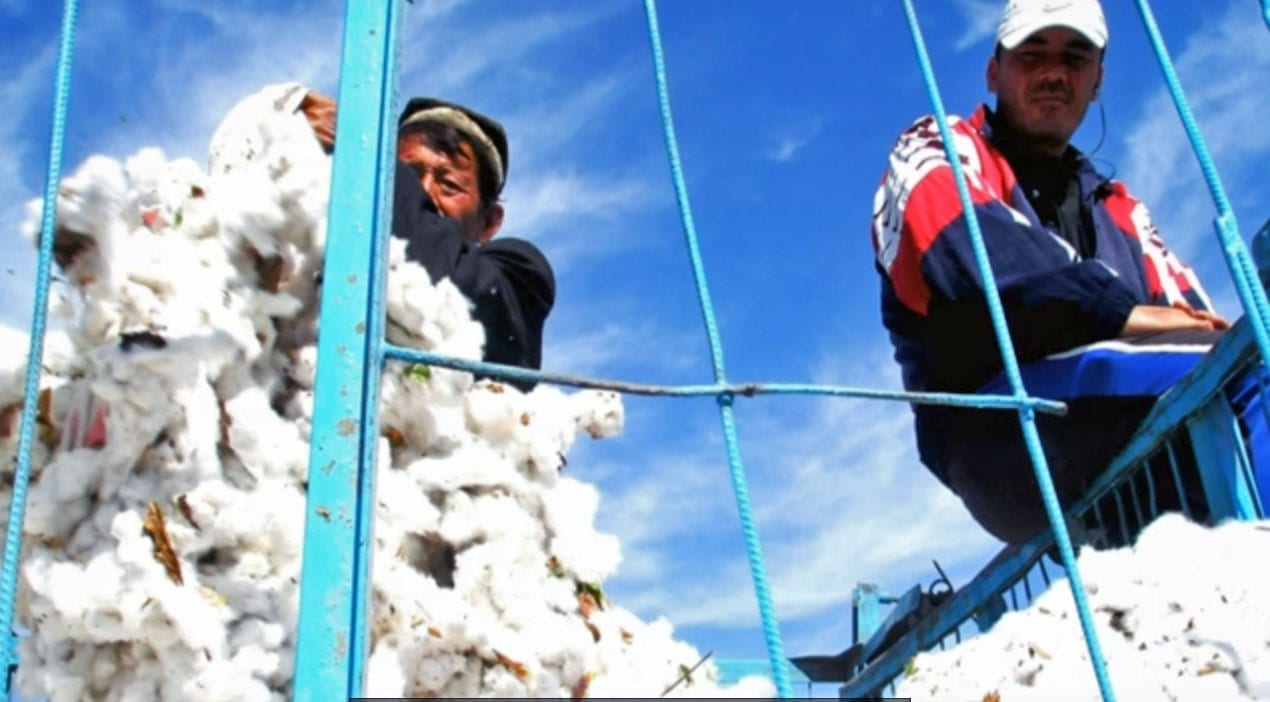
Aug 1, 2016
The World Bank must convey to the Uzbek government that attacks against independent monitors assessing the extent of forced labor in the country’s cotton harvest will not be tolerated. The World Bank must also outline consequences should the attacks continue, according to the Cotton Campaign.
In a July 29 letter to key World Bank officials, the Cotton Campaign, a coalition of dozens of labor and human rights groups that includes the Solidarity Center, wrote:
“The World Bank should take all reasonable measures to create an enabling environment for independent actors to monitor projects that it finances. We have not seen the bank take such measures in Uzbekistan.”
The World Bank Group is providing more than $500 million in financing to the government of Uzbekistan for its agriculture sector and additional financing to multinational companies processing forced-labor cotton in Uzbekistan.
1 Million in Forced Labor During Cotton Harvests
During each fall cotton harvest, the Uzbekistan government forces more than 1 million teachers, nurses and others to pick cotton for weeks, deeply cutting services at schools and medical facilities. Last fall, the government went to extreme measures—including jailing and physically abusing those independently monitoring the process—to cover up its actions.
“The Uzbek government’s repression of human rights monitors has made it impossible for essential mitigation measures of monitoring and grievance redress to function,” according to the coalition, which sent the letter in advance of an early August roundtable meeting of the World Bank, the Uzbek government, the International Labor Organization and diplomatic missions in Uzbekistan.
The coalition also is requesting that the World Bank “obtain an enforceable commitment from the Uzbek government to allow independent journalists, organizations and individuals to have access to all World Bank project-affected areas and to monitor, document and report about forced labor without interference or fear of reprisal.”
Uzbekistan Downgraded in US Trafficking in Persons Report
In June, an Uzbek victim of forced labor in cotton production and three human rights defenders filed a complaint against the World Bank’s private lending arm, the International Finance Corporation (IFC). They seek an investigation into forced labor connected to a $40 million loan to Indorama Kokand Textile, which operates in Uzbekistan. The complaint presents evidence that the loan to expand the company’s cotton manufacturing facilities in Uzbekistan allows it to profit from forced labor and sell illicit goods.
Also in June, Uzbekistan and Turkmenistan, where forced labor in cotton harvests also is rampant, were downgraded to the lowest ranking in the U.S. State Department’s 2016 Trafficking in Persons Report.
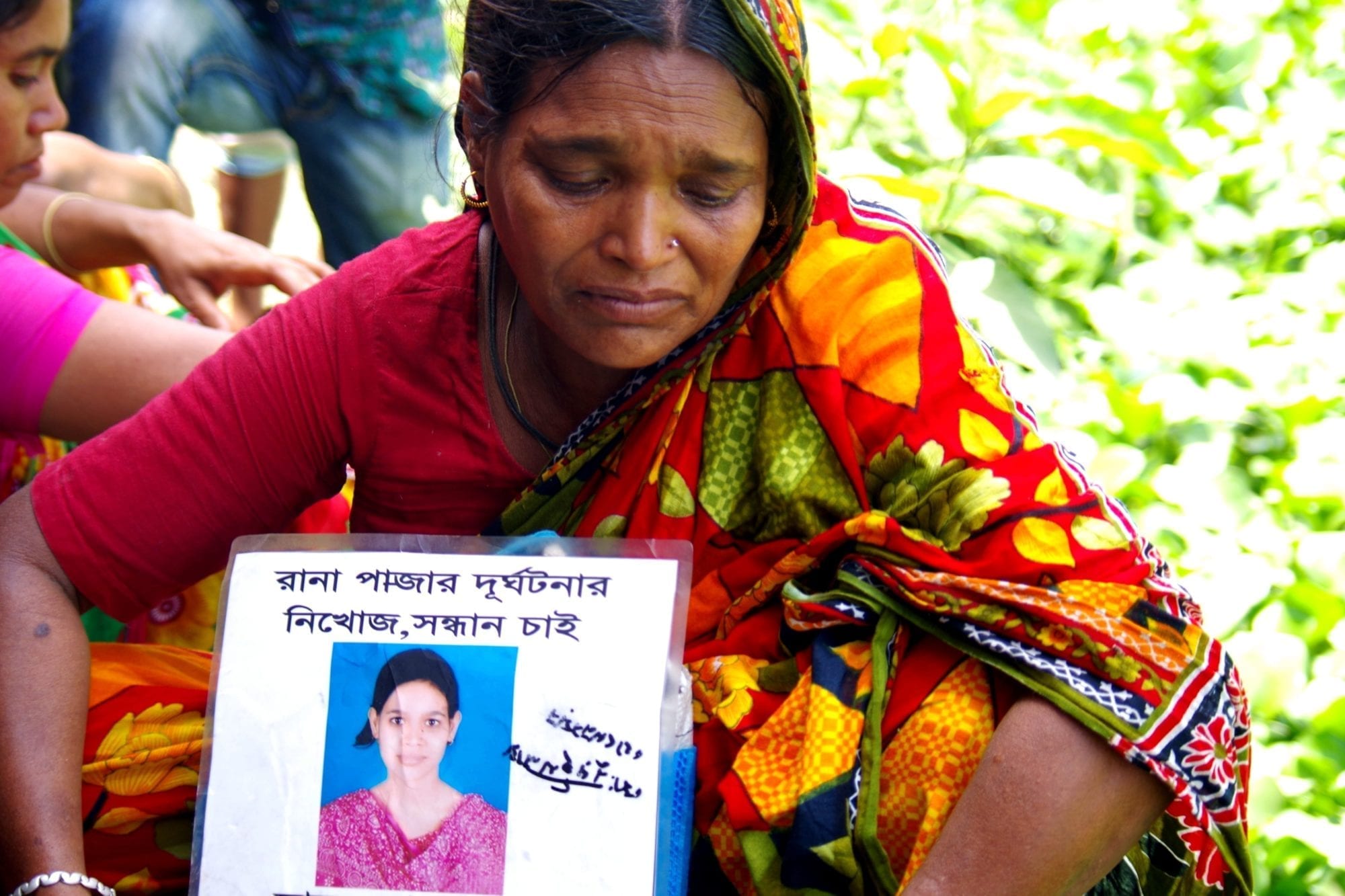
Jul 20, 2016
Bangladesh courts this week charged 38 people with murder for their role in the collapse of Rana Plaza factory building that killed more than 1,130 garment workers in April 2013.
Solidarity Center Asia Region Director Tim Ryan calls the move “a much-delayed step in the right direction,” but adds:
“Over the past three years, the Bangladesh government has approved fewer and fewer union registration applications. Through their unions, workers are able to speak out freely about safety and health concerns at their worksites and prevent horrible tragedies like Rana Plaza. Limiting workers from forming unions puts workers’ safety at risk.”
In 2015, the Bangladesh government rejected 73 percent of union registration applications, according to data compiled by Solidarity Center staff in Dhaka, the capital.
Arim ul-Haq Amin, president of the National Garment Workers Federation, told Australia-based ABC news that he is disappointed it took so long for perpetrators to be held accountable. He called on multinational companies and garment brands to take responsibility for worker safety.
Some brands stepped up after international outrage over the 2013 Rana Plaza and the 2012 Tazreen Fashions Ltd., factory fire prompted creation of the Bangladesh Fire and Building Safety Accord, a legally binding agreement in which nearly 200 corporate clothing brands and trade unions are supporting garment factory inspections and repairs to ensure safe workplaces. Dozens of garment factories have been closed for safety violations and pressing safety issues addressed.
Many of the 2,000 survivors of the Rana Plaza, and families of those who perished, say they received little or no compensation following the building collapse. Many survivors suffered injuries so severe they are unable to work, and without sufficient compensation, are unable to support themselves and their families.
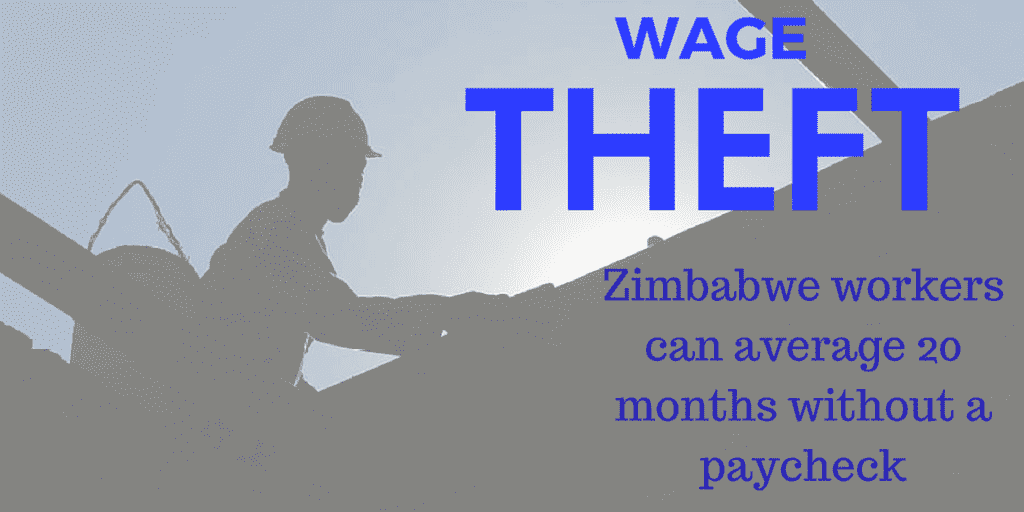
Jul 15, 2016
An astounding 80,000 Zimbabwe workers in formal employment—out of some 350,000 workers—did not receive wages and benefits on time in 2014, according to a new Solidarity Center report, “Working Without Pay: Wage Theft in Zimbabwe,” released today in Harare.
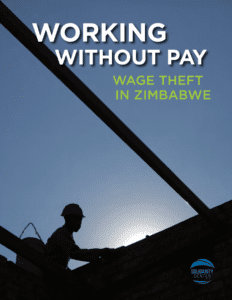 As a result of this widespread wage theft, many workers say they are forced to eat only one or two meals a day; move repeatedly to access affordable housing; and rent two rooms or fewer for their entire family to make ends meet.
As a result of this widespread wage theft, many workers say they are forced to eat only one or two meals a day; move repeatedly to access affordable housing; and rent two rooms or fewer for their entire family to make ends meet.
Through first-person interviews and other research by affiliates of the country’s main trade union confederation, the Zimbabwe Congress of Trade Unions (ZCTU), the report provides hard data behind last week’s successful one-day shut-down of businesses, government and services by workers across Zimbabwe outraged over wage theft and a new law targeting market vendors who make up the vast proportion of the workforce.
Paid Only Enough to Get to Work
One woman interviewed in the report, whose experience is not uncommon, says she has received $26 a month in wages for the past eight months, although her monthly salary is $342. Yet basic living costs, which on average include $60 for renting a single room, $30 for electricity, $15 for water and $22 for transportation to work, mean she only has sufficient funds to get to and from her job.
“This failure to pay what workers are legally entitled to is wage theft in that it involves employers taking money that belongs to their employees and keeping it for themselves,” the report states. “This is a clear violation of international labor standards, as well as national legislation on the employment of workers.”
The report traces the ongoing wage theft to 2012, as employers in the public- and private-sector increasingly began delaying wage payments.
Up to 95% of Zimbabweans Work in Informal Economy
Simultaneously, the number of jobs in the informal economy has skyrocketed, the report points out. Some 6.3 million people made up Zimbabwe’s workforce in 2014, of which 5.9 million workers (94.5 percent) were informally employed, compared with 84.2 percent in 2011, according to “Working without Pay.” An additional 800,000 women and men were in the workforce, but unemployed.
Last month, the government introduced a statutory law that bans imports of basic commodities—a law that directly affects hundreds of thousands of informal economy workers who survive on cross-border trading. Up to 95 percent of jobs in Zimbabwe are in the informal economy, and workers say the new law takes away their livelihoods.
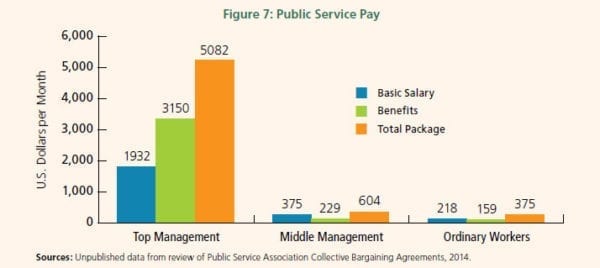
Based on surveys at 442 companies, and the result of extensive research by the Labor and Economic Development Research Institute of Zimbabwe, the report also documents extravagant salaries and benefits to middle and top management even as workers go unpaid and presents recommendations for action to address the problem.
Companies Involved in Wage Theft Must Be Held Accountable
Some of the recommendations include:
- The Ministry of Labor, together with representatives of employers and unions, should review the status of companies that are not paying their workers and assist in developing plans to rectify the injustice.
- Unions representing workers in companies not paying salaries—in full and on time—should demand that the government bring criminal proceedings under the relevant provisions of the Labor Act against employers.
- Trade unions should advocate for payment of interest on late payment.
- The government should set an example by reviewing the wage structure in government agencies and quasi-government agencies to limit benefits to top managers, institute a more just pay scale and prioritize payments to workers through collective bargaining or social dialogue.
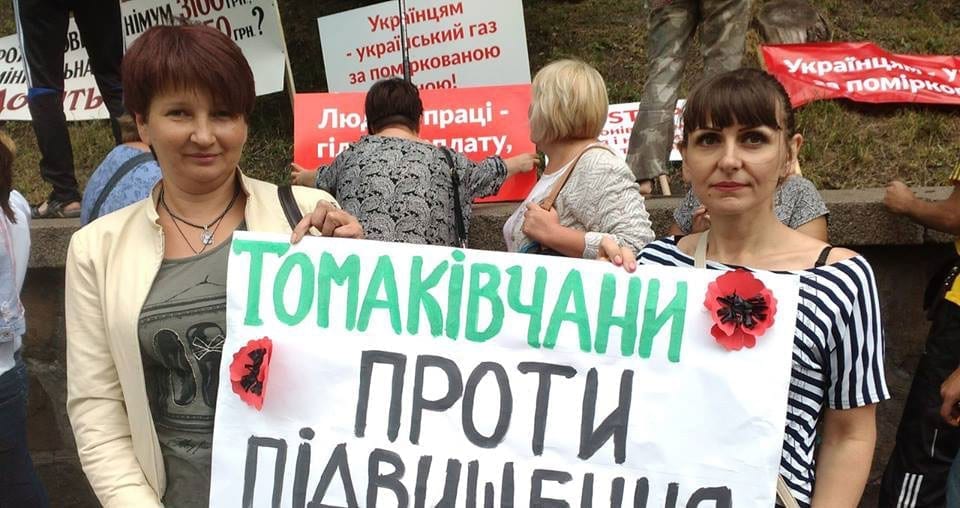
Jul 8, 2016
Tens of thousands of trade union members marched through central Kyiv July 6, protesting austerity measures they believe are undermining standards of living of Ukraine’s working families. In particular, the government plans to continue to implement International Monetary Fund demands that utility subsidies to be cut, drastically raising home heating and utility bills.
In Ukraine, low- and middle-income families already pay 10 percent to 15 percent of their annual wages to cover home heating and utilities. The rate increases, which will more than double home utility bills, have created a public backlash as many people across the country fear they may not be able to afford to pay additional charges.
Economic Reforms on Shoulders of Working People
A coalition of major unions organized the march. The unions have asked that the government negotiate on the rate increases or raise minimum wages—efforts that have so far proven unsuccessful.
“Instead of dialogue with the unions, the government has once again put the economic burden of reforms on to the shoulder of average Ukrainian citizens,” says Mykhailo Volynets, president of the Confederation of Free Trade Unions of Ukraine. “This only contributes to the further impoverishment of the Ukrainian people and the growing risk of social tensions.”
Ukraine Unions’ Protest among the Largest
The July 6 protest was one of the largest street demonstrations the capital has seen in the past two years. Protests and trade union actions, including strikes, are growing in frequency as austerity reforms, including new taxes on public pensions and delayed retirements, take hold in the country.
“There is a real sense of popular frustration across Ukraine now,” says Solidarity Center Ukraine Country Program Director Tristan Masat. “Working people are facing increasingly dire economic consequences due to the austerity measures. They understand there will be hard times, most are even willing to sacrifice, but they don’t want to pay the bill for past and ongoing corruption at the top. Reforms have to be seen as fair.”
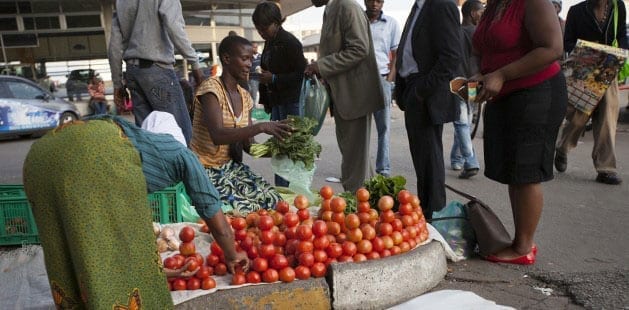
Jul 8, 2016
Protesting the Zimbabwe government’s failure to pay civil servant salaries and outraged over a new law targeting market vendors who make up the vast proportion of the workforce, working people across Zimbabwe waged a successful one-day shut-down of businesses, government and services July 6.
The “stay-away” day, one of the largest popular protests in years, follows days of unrest over the economic failure of the government, which working people say is unfairly targeting their pocketbooks.
Last month, the government introduced a statutory law that bans imports of basic commodities—a law that directly affects hundreds of thousands of informal economy workers who survive on cross-border trading. Up to 95 percent of jobs in Zimbabwe are in the informal economy, and workers say the new law takes away their livelihoods. Merchants in towns like Beitbridge, which borders South Africa, say sales already are plummeting, and they have waged large-scale protests in recent days.
Requesting the government rescind the law, The Zimbabwe Chamber of Informal Economy Associations (ZCIEA) described it as a “predatory form of governance that shuts all doors of livelihoods to ordinary citizens” by making it impossible for impoverished vendors to afford the new licenses required to trade.
Working People at the Brink
With little formal employment and informal economy jobs under siege, working people say they are being pushed to the brink.
Formal economy workers like teachers do not know when they will be paid because the government unexpectedly moves pay dates. Teachers who would typically get paid on June 18 and 19 have been informed they will receive their June salaries on July 7.
Following the strike action, health workers, who had been told that their salaries would only be available on July 14, have now had their pay date brought forward to July 8.
Public transport workers who make their living on the roads have been especially affected by multiple police road blocks set up to collect fines for such “violations” as not having a fire extinguisher or using manufacturer-supplied temporary spare tires.
In a statement, the Zimbabwe Congress of Trade Unions (ZCTU) urged the government to “honor its obligation of creating employment for its citizens instead of implementing useless policies that result in civil unrest and public outcries.”
Zimbabwe Strike Highlights Economy in Crisis
The downward spiral of Zimbabwe’s economy has been fueled by an increasing number of business shutdowns, layoffs and cash shortages in banks as people pull out money in the unstable environment. The country’s official currency is the U.S. dollar.
Reacting to the July 6 shutdown, the government blocked the Internet to prevent access to social media platforms like the popular WhatsApp. But by noon, Zimbabweans were circulating ways to breach the government firewall and messages started flowing freely. Mobile companies acknowledged the breakdown of the Internet, and more specifically the WhatsApp platform, but did not offer any explanation.







